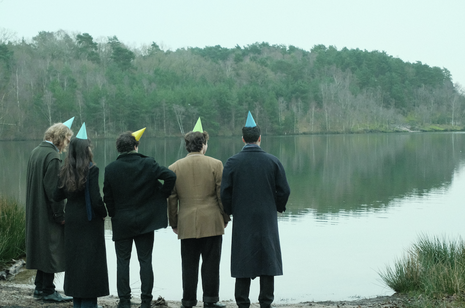Harold Pinter’s The Birthday Party should be celebrated
Absurdist fiction intertwines with the harsh reality of Alzheimer’s and Dementia in this deeply touching performance

The Birthday Party is arguably Pinter’s most notable work - a musing on absurdity, power, ambiguity, meaninglessness and sanity. It follows the story of Stanley Webber, a guest in a seaside lodge owned by childless couple Meg and Petey. When two unknown men show up for Stanley’s birthday party, the story descends into a tangle of disorientation, disorder and paranoia. This play explores existentialist musings on the human condition; what happens when human existence lacks purpose or meaning, and how do we exist in a world of irrationality, ambiguity and senseless terror and violence?
Absurdist fiction can be extremely difficult to stage. It can often feel untethered; it can lack connection and purpose – more like reading a philosophical treatise than going to see a piece of theatre. The genius, however, of this specific production was the way it was able to reconcile these philosophical ideas with a deeply personal and human story. Katie Wrench’s directorial vision expertly re-contextualised Pinter’s language to grapple with the very real experience of Alzheimer’s and Dementia. Stanley gradually loses the ability to understand his surroundings, becoming increasingly isolated and paranoid. He gradually loses his capacity to communicate and recognise others. This reframing device made the story all the more disturbing, as the audience recognises the horror and heartbreak of losing a relative or relationship to this terrible disease. For me, watching this play felt extremely personal. Rather than a psychological thriller, it became a kind of tragedy – a sensitive yet agonising exploration of what it means to lose your mind. Whilst the play centred on the exploration of memory loss, I was launched into vivid memories of childhood, grappling with my own experiences of losing a grandparent to this disease.
“The genius of this production was the way it was able to reconcile these philosophical ideas with a deeply personal and human story”
The real beauty of the production for me came from Wrench’s sensitivity and delicacy in production design. I have seen a tendency in absurdist theatre to lean towards a more abrasive, explicit and severe exploration of the themes of horror and violence. This production, however, knelt on the side of subtlety and insinuation, lending itself to be all the more unsettling and agonising. The subtle symbolism of the production was particularly notable in the sound design. At the beginning of the play, the sound of a radio came on: a muffled, indistinguishable sound – the only hint (outside of the conversation) of an outside world. There was a sense that the ‘outside’ was a place to be feared, somewhere unknowable and incomprehensible, contributing to an undertone of menace in the first act. Particularly powerful was the use of miscellaneous sounds – whistling, the banging of the tambourine - used to stabilise Stanley, to tether him to reality. This fed into the theme of dementia, as the production’s Instagram page highlights the way in which music can mitigate the lack of ability to communicate in dementia patients.
“I was launched into vivid memories of childhood, grappling with my own experiences of losing a grandparent to this disease”
Another aspect of the design that contributed to the unnerving atmosphere of the play was the use of symbolism in costume, set and acting. In the beginning, the characters are clearly distinguishable, Meg and Lulu dressed in nurses’ scrubs, whilst Stanley looks dishevelled in his pyjamas, clearly indicating that he is their patient. As the play progresses, the divisions between each character becomes blurred. The actors swap accents and clothing, mannerisms and personalities. We can’t seem to keep a name tethered to a face, as McCann becomes Goldberg, Lulu becomes Meg and back again. The boundaries between the subject and the other become loose and frail. The characters reveal conflicting memories, they change names, they disengage from reality. Whilst the story began in Meg’s living room in a lodge by the sea, the stage space becomes detached and isolated from the outside by act three, representing a fragment of Stanley’s psychic space.
The risk of putting on this play is that the audience becomes alienated by the disconcerting and unnerving themes in the production. This was far from the case in my experience. I was kept on the edge of my seat, alternating between moments of joy and dread. ‘The Birthday Party’ is known as a ‘comedy of menace’, a kind of play in which some obscure uncontrollable threat lies just out of view. This year’s production perfectly teetered between ecstasy and fear, leaving the audience in floods of laughter and yet gripped by an incommensurable sense of danger. This synthesis was brilliantly manufactured by the actors on stage. Particularly notable was Joe Wolffe’s ‘Goldberg’, whose dryness, conviviality, and brash nature subtly hinted towards the more sinister aspect of his personality. He commanded the stage, a kind of grotesque caricature. He lulled the audience into a false sense of security with his excellent sense of comedic timing, before exploding at various points with rage and malice. Similarly impressive was Maia von Malaise’s portrayal of Meg. At first, Meg comes off as likeable: a kind of energetic, funny, caring figure in Stanley’s life. Maia von Malaise, however, gives Meg depth – Meg is almost sickeningly sweet, barely masking the patronising way in which she infantilises and controls Stanley. There is a sense that Stanley is vulnerable, that he is at the whim of those surrounding him. The ensemble as a whole worked together as a powerful collective – the play was fast paced, quick-witted, vibrant and engaging – each actor bringing a unique and dynamic aspect to the story.
The genius of this production was that it brought the meta-philosophical themes into a real-life context, and allowed it to be accessible to all. For those suffering from dementia, your ability to self- reflect and to recognise others is significantly impaired. Without memory and communication, we can no longer create a story of ’what makes you ‘You’.’ You lose all sense of self - existence no longer makes sense. Wrench again indicates this connection as the photograph of Stanley on the wall gradually blurs into an unrecognisable image. The melding of existentialism with dementia allows us to consider what makes us human, and how it might be to live in a world that does not seem to make sense anymore.
By placing absurdist theatre in the context of dementia, Katie Wrench has created a visual and intellectual feast, a piece of theatre that not only provokes thought but also remains deeply personal and touching. The quality of acting and design are brilliantly executed, and I would urge people to go see for themselves. The production is also fundraising for Dementia UK, which supports those living with dementia and Alzheimer’s. So, if you have a spare evening this week, go and see ‘The Birthday Party’, it is a production that, like its title, should be celebrated.
The Birthday Party is showing at the Corpus Playroom until Saturday 3rd February
 News / SU reluctantly registers controversial women’s soc18 December 2025
News / SU reluctantly registers controversial women’s soc18 December 2025 Features / Should I stay or should I go? Cambridge students and alumni reflect on how their memories stay with them15 December 2025
Features / Should I stay or should I go? Cambridge students and alumni reflect on how their memories stay with them15 December 2025 News / Dons warn PM about Vet School closure16 December 2025
News / Dons warn PM about Vet School closure16 December 2025 News / Cambridge study finds students learn better with notes than AI13 December 2025
News / Cambridge study finds students learn better with notes than AI13 December 2025 News / Uni registers controversial new women’s society28 November 2025
News / Uni registers controversial new women’s society28 November 2025









